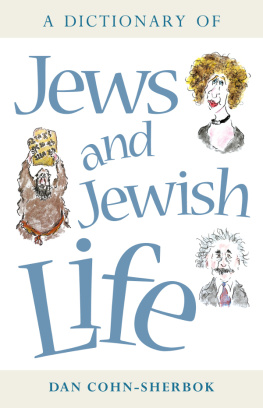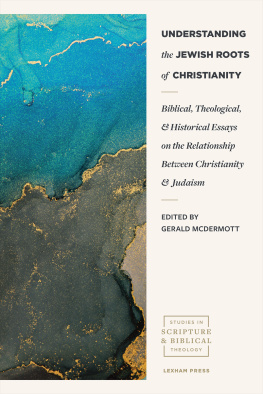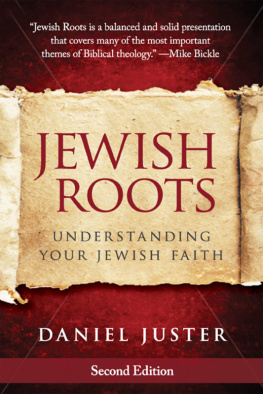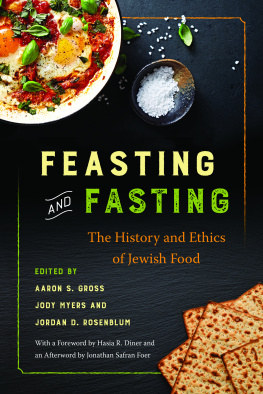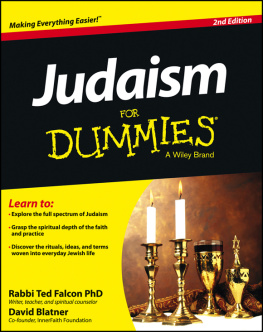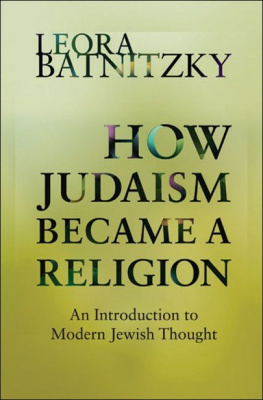Nicholas de Lange is Professor of Hebrew and Jewish Studies in the University of Cambridge. His previous books include Atlas of the Jewish World (1984), An Illustrated History of the Jewish People (1997), An Introduction to Judaism (2000), and Judaism (2nd edition, 2003).
The Penguin Dictionary of
JUDAISM
Nicholas de Lange

PENGUIN BOOKS
PENGUIN BOOKS
Published by the Penguin Group
Penguin Books Ltd, 80 Strand, London WC2R 0RL , England
Penguin Group (USA) Inc., 375 Hudson Street, New York, New York 10014, USA
Penguin Group (Canada), 90 Eglinton Avenue East, Suite 700, Toronto, Ontario, Canada M4P 2Y3
(a division of Pearson Penguin Canada Inc.)
Penguin Ireland, 25 St Stephens Green, Dublin 2, Ireland (a division of Penguin Books Ltd)
Penguin Group (Australia), 250 Camberwell Road, Camberwell, Victoria 3124, Australia
(a division of Pearson Australia Group Pty Ltd)
Penguin Books India Pvt Ltd, 11 Community Centre, Panchsheel Park, New Delhi 110 017, India
Penguin Group (NZ), 67 Apollo Drive, Rosedale, North Shore 0632, New Zealand
(a division of Pearson New Zealand Ltd)
Penguin Books (South Africa) (Pty) Ltd, 24 Sturdee Avenue, Rosebank, Johannesburg 2196, South Africa
Penguin Books Ltd, Registered Offices: 80 Strand, London WC2R 0RL , England
www.penguin.com
First published 2008
1
Copyright Nicholas de Lange, 2008
All rights reserved
The moral right of the author has been asserted
Except in the United States of America, this book is sold subject to the condition that it shall not, by way of trade or otherwise, be lent, re-sold, hired out, or otherwise circulated without the publishers prior consent in any form of binding or cover other than that in which it is published and without a similar condition including this condition being imposed on the subsequent purchaser
978-0-14-191710-8
To YHD
Yedid nafshi
Contents
List of Tables
List of Maps
Preface
In the course of the 20th century Judaism gradually became an English-speaking religion. More than half the Jews in the world today speak English as their mother tongue or use it in their everyday lives, and English is the language in which most books on the Jewish religion are published. (Before 1914 it was German, together with its offshoot Yiddish, that occupied this role.) But understanding what is said or written, by Jews and non-Jews, about Judaism in English is not always plain sailing, partly because there is a lot of technical terminology, such as one finds in any religion, and partly because foreign languages keep getting in the way not just ancient languages like Hebrew and Aramaic, which are still used everywhere in Jewish worship, but a bewildering mass of modern languages, since many Jews are immigrants who remain attached to long-familiar expressions. And even quite ordinary English words are sometimes used in Jewish contexts in a sense that may not be obvious to an outsider.
My aim in this book is to provide a handy guide to the distinctive vocabulary of Judaism, for specialists, students and general readers. In preparing it I have read a large number of books, keeping a close eye on the technical terms and special usages. I have also tried to answer many of the questions I have been asked in the course of a long career spent teaching about Judaism.
The main focus of the dictionary is on the beliefs and practices of Judaism, and closely related topics. Some topics from general history and religious studies have been included (e.g. Aristotelianism, Enlightenment, Zionism), but I have addressed only the aspects of these that are directly relevant to Judaism. I did not feel it appropriate here to address such subjects as the Crusades, the Spanish Inquisition or antisemitism, the Dead Sea Scrolls, Apocrypha and Pseudepigrapha, or Christian and Muslim attitudes to Judaism, even though they are sometimes considered to belong to the story of Judaism. Once one starts straying further afield it is hard to know where to draw the line, and I wanted this book above all to have the coherence that results from clearly drawn boundaries. I have not sought to usurp the task of the many dictionaries of the Bible. There is no denying the importance of the Bible in Judaism, and I have tried to give the kind of information about biblical books and characters that students of contemporary Judaism are likely to need. As a general rule, I have directed the beam of my searchlight primarily at Judaism as it exists today: earlier layers are introduced as background, and I have tried to eschew mere antiquarianism.
I have generally tried to keep the entries short and factual, particularly where straightforward technical expressions are concerned. I did not hesitate, though, to add more information where I thought it would assist understanding. For example, in glossing words such as minyan or Passover, I have provided both a brief definition and what I hope is useful information that may help a puzzled reader to understand the context in which the word is used in a book or article. I have also made free use of cross-referencing, to avoid unnecessary repetition and also to provide a gateway into those paper-chases that make dictionaries such fun to use. In some cases, where the subject-matter seemed to justify it, I have given myself more freedom, and provided survey essays on specific topics. These are mainly large subjects that I did not feel I could do justice to in a few words, and that are essential for a fuller understanding of the history or the teachings of Judaism. Most are subjects that I do not feel are adequately covered in other reference books about Judaism. I have also inserted some short essays on subjects as varied as books, honey and humility on which I felt readers might find a Jewish perspective interesting.
There are many different Jewish communities, and each has its own words and phrases. I have tried to be inclusive, and I have not assumed that one form of Judaism is the norm and the rest are aberrations. I apologize in advance for any omissions or misrepresentations.
Spelling is always a problem when transliterating from languages that use a non-Roman alphabet. The scholarly systems of Hebrew transcription often yield forms that are far removed from those actually in current use. Instead I have aimed to follow as closely as possible the forms I found in my reading, and the usual pronunciation of the words. More information about this can be found in the Introduction.
Translations are my own unless otherwise indicated.
In writing any book one inevitably runs up debts of gratitude. I cannot thank by name all those who have helped me with specific enquiries: they know who they are and that I am grateful to them. Andrew Berns, of the University of Pennsylvania, generously read through a draft of the entire alphabetical section and made invaluable comments and corrections. Eva Maria Lassen, of the Danish Institute for Human Rights, kindly drafted an article on human rights which forms the basis of the present entry. The original suggestion of compiling such a dictionary was put to me by Nigel Wilcockson in the autumn of 2002: I hope he is pleased with the outcome of his initiative. I must also thank all those at Penguin Press who have had a hand in the book, particularly Kristen Harrison, as well as an anonymous reader who made some very helpful suggestions.
Last but not least I am grateful to my parents, for instilling in me an enduring love for Judaism, and to my children, for asking challenging questions.


